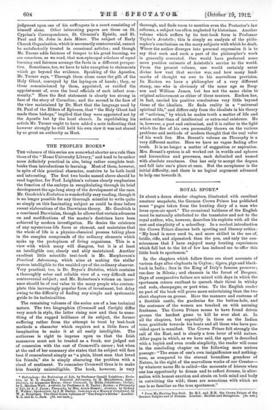THE PEOPLE'S BOOKS.*
THE volumes of this series are somewhat shorter as a rule than those of the " Home University Library," and, tend to be rather more definitely practical in aim, being rather complete text- books than introductions to learning. Most of them, however, in spite of this practical character, contrive to be both lucid and interesting. The first two books named above should be Peed together, for Prof. Leighton's volume clearly emphasizes the function of the embryo in recapitulating through its brief development the age-long story of the development of the race. Mr. Goodrich's Evolution is wonderfully easy reading, though it is no longer possible for any thorough scientist to write quite so simply on this fascinating subject as could be done before recent elaborations of the Darwinian theory. Mr. Goodrich is a convinced Darwinian, though he allows that certain advances on and modifications of the master's doctrines have been achieved by modern investigation. He denies the existence of any mysterious life force or element, and maintains that the whole of life is a physico-chemical process taking place in the complex compounds of the ordinary elements which make up the protoplasm of living organisms. This is a view with which many will disagree, but it is at least an intelligible one, clearly and ably maintained. Another excellent little scientific text-book is Mr. Macpherson's Practical Astronomy, which aims at making the stellar system intelligible to the unaided eye of the ordinary observer. Very practical, too, is Dr. Bryce's Dietetics, which contains a thoroughly sober and reliable view of a very difficult and controversial subject; and Mr. Robertson's volume on insur- ance should be of real value to the many people who contem- plate this increasingly popular form of investment, but delay owing to the difficulty of finding any simple and systematic guide to its technicalities.
The remaining volumes of the series are of a less technical nature. The two biographies (Cromwell and Carlyle) differ very much in style, the latter rising now and then to some- thing of the rugged brilliance of its subject, the former suffering rather from the attempt to treat by text-book methods a character which requires not a little force of imagination to make it at all easily intelligible. The authoress is right to impress upon us that the Irish massacres must not be treated as a freak, nor judged out of connexion with the rest of Cromwell's career ; but when at the end of her summary she states that its subject will fare best if remembered simply as " a plain, blunt man that loved his friends," she is simply obscuring the problem with a cloud of sentiment. To remember Cromwell thus is to make him frankly unintelligible. The book, however, is very
• Embryology: the Beginnings of Life, by Professor Gerald Leighton ; Evolu- tion, by E. 8. Goodrich ; Practical Astronomy, by H. Macpherson, jour.; Dietetics, by Alexander Bryce ; Oliver Cromwell, by Hilda Johnstone ; Carlyle, by L. Maclean Watt ; Aristotle, by Professor A. E. Taylor; Beckon : a Philosophy to Life, by A. J. Jones ; Theosophy, by Mrs. Annie Besant ; Aviation, by Sydney F. Walker; Syndicalism, by J. H. Harley; Insurance as a Means of Investment, by W. A. Robertson. The third dozen ye/tunes of " The People's ROWEL" London : T. C. and E. C. Jack. [td. net each.],
thorough, and finds room to mention even the Protector's law reforms, a subject too often neglected by historians. Another volume which suffers by its text-book form is Professor Taylor's Aristotle ; this is simply an analysis of the philo- sopher's conclusions on the many subjects with which he dealt, Where the author diverges into personal expression it is to say that such and such a part of the philosopher's work is generally overrated. One would have preferred some more positive estimate of Aristotle's service to the world. From the present volume, one would certainly never divine how vast that service was, and how many len& marks of thought we owe to his marvellous prevision. In Eucken we have a philosopher of a very different stamp, one who is -obviously of the same age as Berg- son and William James, but has not the same claim to original achievement as either of these masters. Eucken has, in fact, carried his positive conclusions very little beyond those of the idealists. He finds reality in a " universal spiritual life," and differs only from the idealists in his theory of "activism," by which he makes truth a matter of life and action rather than of intellectual or extra-real existence. He is, however, a poet and enthusiast, and it is rather in the light which the fire of his own personality throws on the various problems and methods of modern thought that the real value of his work lies. Mrs. Besant's volume on Theosophy is a very different matter. Here we have no vague feeling after truth. It is no longer a matter of suggestion or aspiration. Mrs. Besant's system is all worked out in worlds and spheres and hierarchies and processes, each delimited' and named with absolute exactness. One has only to accept the dogma and fall into one's place at once. But the acceptance is the initial difficulty, and there is no logical argument advanced to help one towards it.














































 Previous page
Previous page